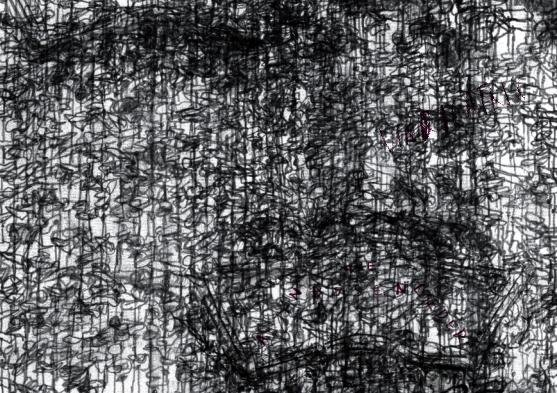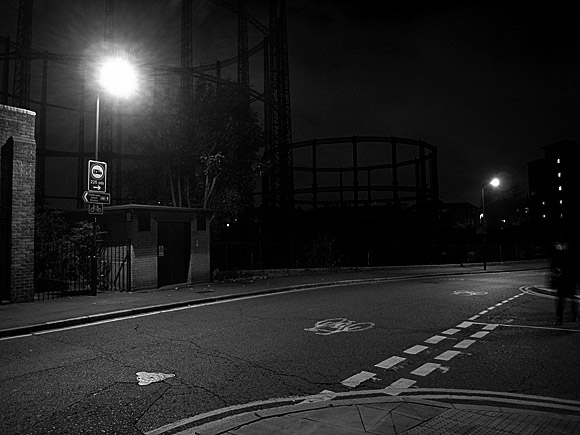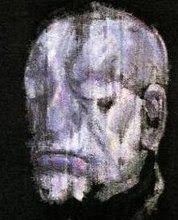
Kudos to K-Punk in last month’s Wire magazine for bringing a little-remarked upon album which sneaked out in the latter days of 2009 to my attention. Vindicatrix sits in an almost entirely unexplored region of musical terra incognita, perhaps only previously visited by late-era Scott Walker, and even he never quite travelled so far-out into such unfamiliar spaces. Vindicatrix’s earlier releases on the Mordant Music label were largely club-oriented pieces of gloom-techno or glum-post-dubstep, garnished with his Scott-at-the-bottom-of-a-reverb-pit style vocals, and were intriguing but somewhat limited in scope. With Die Alten Bösen Lieder, Vindicatrix extends this style into a series of bizarrely broken assemblages, a parade of semi-functioning aesthetic machines: neurotoxic Weimar Republic house, serialist ethno-dubstep, dada-nightmare isolationist ambient, and a beautiful middle sequence of unearthly liminal ballads. A friend of mine described the album as sounding “like you're sitting in a room adjoining a performance of Wozzeck and a Shackleton gig” and this certainly captures something of the flavour of the earlier tracks, combining dissonant circling choral harmonies with rickety bleached-bone drum patterns and dolorous vocal ruminations.
But really the core of the album is the expanse of three alien-art-ballads beginning with “Lack of Correspondence”. Shifting away from the subtly dubstep and techno inflected percussive textures of the earlier tracks, these songs, rather than operating on principles of postmodern combination of pre-existing generic forms, instead home in on and magnify the most alien-sublime elements of Scott Walker’s late works. Vindicatrix takes late-Walker at his most lushly orchestral, those immense pieces of extraterrestrial lieder like “Sleepwalkers Woman” and “Patriot (a single)”, sketching vast landscapes of unknown emotions, then drifts even further out into an ever more unknown oneiric psychological hinterland. “Lack of Correspondence” begins with a kind of drolly humorous narrative of religiously inspired love before folding into cut-up vocal fragments and teeming swarms of rapidly edited white noise shards. “Rubbing Pages Out” merges backmasked noise with vast banks of shimmering strings to create a glowing mass of iridescent sound, akin to the final glorious chord of a romantic symphony captured and transformed into a continuous plateaux, topped with occasional interventions by a conciliatory tuba. On “Insulinde”, at almost ten minutes the longest and most singular piece on the album, we enter a strange territory of distantly tolling metals, subliminal bass drones, oddly harmonised vocals, chimingly sinister bells, a recurrent motif of five metallic thumps, sampled operatic wailing. A rising tumult of strings: “Behind closed doors. There is. Violence. In. Outer chambers. Violence.” An unnameable ritual. All this material accumulates, disperses, reforms, dreamlike in the sense of being unplaceable, yet naggingly familiar, the relations between these sound-objects intuitively understandable yet forming a strange sort of sense, in a liminal grammar like a sequence of words caught in the instant before sleep, a memory which can be recalled but cannot be placed, sitting between the sinister and the gloriously beautiful.

The album concludes with the inhuman bleak expanse of “A Long Straight Road in a Cold City”, a continual sub-bass filched from some 2006 dubstep track, but shorn of its percussive-clothing, left to prowl through the remnants of a Ligeti choir, whilst acoustic drums and screams burst in momentarily to assassinate the calm with the unintelligible violence promised elsewhere on the album. In an era when experimentation with song form seems locked into past paradigms, this is an enormously welcome and necessary collection, acutely aware of contemporary sonic mores but able to spin them into new and unsettling forms, capable of rendering the beautiful strange and the strange beautiful, rather than simply ungainly.







